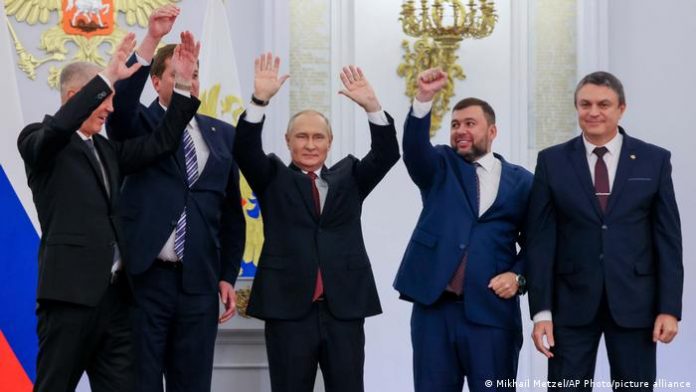Russian President Vladimir Putin signed the relevant annexation documents at a televised ceremony in the Kremlin. The occupation chiefs of the four regions, Denis Pushilin (Donetsk), Leonid Pasechnik (Luhansk), Vladimir Saldo (Kherson) and Yevgeny Balitsky (Zaporizhia), also signed the agreements. The annexation is not recognized internationally.

Kremlin chief Putin and the occupation chiefs of Ukraine’s eastern regions are cheering the annexation
In his speech, Putin explained the annexation as “the will of millions of people.” “There is nothing more important than the will of millions to return to their historic homes,” he said. In this context, he described the collapse of the Soviet Union a good 30 years ago as a tragedy.
Putin: Kiev leadership consists of neo-Nazis
Once again he accused the Ukrainian leadership of being made up of neo-Nazis. In his speech, he justified the Russian war of aggression in Ukraine as restoring historical justice and liberating Russia from Western oppression. He called on Kyiv and the West to stop hostilities immediately and start negotiations.
The people in Cherson, Donetsk, Luhansk and Zaporizhia are now Russian citizens – “forever”. Only last night did the Kremlin chief recognize the occupied Ukrainian regions of Cherson and Zaporizhia as independent states in another act that violates international law. From Moscow’s point of view, this is a prerequisite for the regions to be able to apply for admission to the Russian Federation. Seven months ago, even before the war began, Putin had declared Donetsk and Luhansk to be independent “people’s republics”.
Referenda: No minimum democratic standards
By the beginning of the week, mock votes on joining Russia had been held in all four regions under the control of the Russian military administration. After that, the Russian occupiers spoke of an allegedly overwhelming approval of the population.
The pseudo referendums on the accession of occupied regions in southern and eastern Ukraine to Russia are not recognized worldwide. This is because they were held in violation of Ukrainian and international laws and without minimum democratic standards. The votes were also not verifiable by independent observers. There were also numerous reports that residents of the regions felt pressured.
Kremlin spokesman talks about nuclear strike
The four areas are not yet fully controlled by Russia. In addition, the Ukrainian army has launched a counter-offensive, in the course of which it is currently gaining ground in the Donetsk region. The Russian leadership had recently stated several times that it would react “with all available means” to such attacks, which are now being interpreted as attacks against its own territory. Putin repeated this threat during his speech.

Kremlin spokesman Dmitry Peskov does not yet know the borders of the annexed areas in Ukraine (archive photo)
This had sparked speculation about a possible nuclear strike by Russia. However, Kremlin spokesman Dmitry Peskov has dampened such expectations. He called references to the Russian military doctrine, according to which an attack on Russian state borders could be answered with a nuclear strike, inaccurate. The military doctrine states that Russia can respond to attacks with a nuclear strike if the existence of the state itself is threatened.
No “exact limits”
Russia still has to “clarify” the “exact borders” of two of the four Ukrainian regions, Peskov said. The “People’s Republics” of Donetsk and Luhansk would be recognized by Russia “within the 2014 borders,” said the Kremlin spokesman. Regarding the Cherson and Zaporizhia regions, “I still have to clarify that, I can’t answer this question at the moment,” Peskov added two hours before the official ceremony.
nob/rb (dpa, afp, ap)












